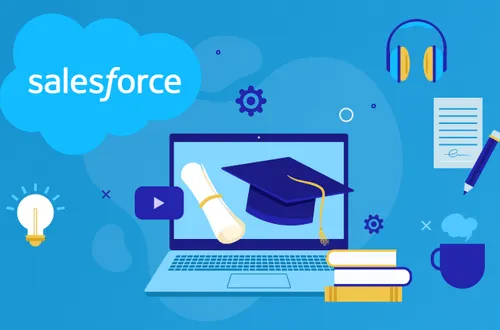
Perhaps you are considering why Salesforce is a favorable choice for the educational industry. There are numerous reasons, along with significant benefits. Drawing from the Forrester Total Economic Impact™ of Salesforce for Education report, which examines a typical public four-year university with 7,000 faculty and staff, 40,000 students, and annual operating revenues of approximately $1 billion, we observe outstanding outcomes such as :
- A Return on Investment (ROI) of 153%
- Present Value (PV) of benefits at $10 million
- A Net Present Value (NPV) of $6.1 million
- A payback period of 14 months.
And it’s not a unique case, real life examples, such as Gordon College achieved a remarkable 294% return on investment in less than four months by transitioning to Salesforce. Are you ready to emulate their success and see immediate improvements in your advancement efforts?
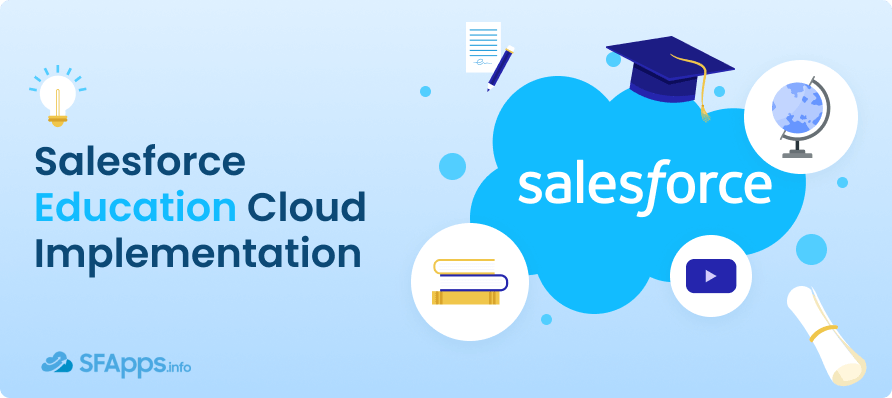
Introduction to Salesforce Education Cloud
Educational institutions are adapting to a complex environment, where they are tasked with enhancing both enrollment and graduation figures. At the same time, they must develop effective strategies for attracting and keeping academic and administrative staff. Simultaneously, there’s an increasing pressure to provide personalized experiences that meet the elevated expectations of students and staff alike.
Salesforce has developed the Education Cloud, a comprehensive suite designed to assist institutions in overcoming these challenges. This platform is tailored to empower educational bodies to deliver next-level experiences that cater to the evolving needs of lifelong learners. Salesforce Education Cloud is more than a technological solution; it’s a catalyst for educational excellence. By integrating this platform, schools, universities, and training organizations can simplify administrative processes, create personalized learning experiences, and access a holistic view of student interactions and performance. This not only improves operational efficiency but also sets the stage for students’ success in an increasingly competitive world.
This guide is created to provide an in-depth look into how organizations of various types can harness the power of Salesforce Education Cloud. From uncovering the potential costs to navigating the implementation process and addressing possible challenges, we aim to equip you with the knowledge and strategies needed for a seamless integration.
Whether you represent a sprawling university, a specialized vocational school, or a dynamic corporate training department, this guide is tailored to illuminate how Salesforce Education Cloud can transform your educational management approach. Join us as we delve into the world of Salesforce Education Cloud, uncovering the keys to unlocking its full potential for your institution.
- Overview of Salesforce Education Cloud
- Salesforce for Universities and Other Organizations That Can Benefit from Salesforce Education Cloud Implementation
- Salesforce Education Cloud Pricing
- Key Factors for Selecting Salesforce CRM Tools for Education
- Implementing Salesforce CRM in Education
- Navigating Challenges with Salesforce CRM Implementation
- Education Cloud Solutions
- Education Cloud Services
- Team Setup for Implementing Salesforce Education Cloud
- How to Become a Salesforce Education Cloud Certified Consultant?
- Frequently Asked Questions about Salesforce Education Cloud Implementation
- What is Salesforce Education Cloud?
- How does Salesforce Education Cloud support student success?
- Can Salesforce Education Cloud integrate with existing LMS and SIS systems?
- How long does it typically take to implement Salesforce Education Cloud?
- Is training available for staff on how to use Salesforce Education Cloud?
- How does Salesforce ensure data security and compliance within the Education Cloud?
- Can Salesforce Education Cloud be customized to fit specific institutional needs?
- What types of educational institutions can benefit from Salesforce Education Cloud?
- How does Salesforce Education Cloud facilitate communication with students?
- Are there any grants or discounts available for educational institutions implementing Salesforce Education Cloud?
- How does Education Cloud Salesforce support alumni relations and fundraising efforts?
- What kind of support can institutions expect after implementing Salesforce CRM for Higher Education Cloud?
Overview of Salesforce Education Cloud
What are the reasons to use Salesforce CRM in the Education Industry? They are simple and powerful:
- Salesforce CRM revolutionizes the way educational institutions embrace new business models and create personalized experiences, making it unnecessary to constantly update old systems. It allows faculty and staff the freedom to work remotely, boosting teamwork and making it simpler to track important metrics like retention, enrollment, and engagement through various channels.
- The Salesforce CRM provides a comprehensive view by linking information from recruitment, admissions, student life, advancement, and marketing. This holistic approach is a significant shift from isolated solutions that address only specific problems, ensuring a detailed view of every member of the community without the confusion of juggling data from multiple sources.
- Moreover, this technology gives faculty and staff more time to concentrate on what they do best: ensuring that students have the necessary support and resources to excel. Salesforce CRM streamlines communication with potential students, makes self-service more efficient, and enhances alumni engagement and fundraising efforts. This means faculty and staff spend less time searching for information across different systems, allowing them to dedicate more effort to student success.
Benefits of Salesforce Education Cloud
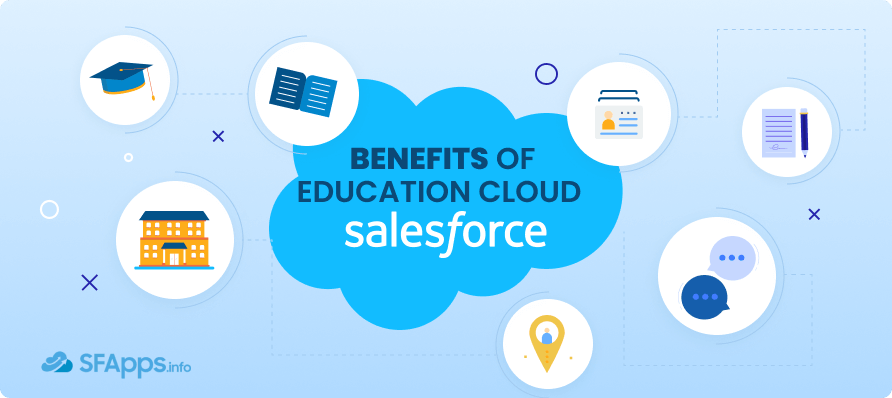
Salesforce Education Cloud offers a range of benefits that cater to the diverse needs of educational institutions. At its core, this platform is designed to streamline operations, foster personalized engagements, and provide a comprehensive view of student data. This feature gives staff a full view of each student’s academic path, including their studies, where they learn, and their daily faculty interactions. With such detailed information easily accessible, staff can more efficiently enhance student experiences and create more future opportunities, without the worry of time-consuming or expensive processes. This allows for a focus on teaching and learning, saving valuable time that would otherwise be spent on administrative tasks. Here are some key advantages:
- Elevated Student Engagement: Salesforce’s advanced CRM system empowers educational institutions to craft customized communication strategies that resonate with each student’s unique needs and preferences. This approach enables schools to monitor student achievements and identify areas where proactive support can make a significant difference, ultimately enhancing student success and satisfaction.
- Increased Operational Efficiency: The platform automates a wide range of administrative processes, spanning admissions, enrollment, and alumni relations. This Salesforce higher education automation liberates essential resources, allowing staff to dedicate more effort towards strategic goals and improving the overall learning environment.
- Insightful Data-Driven Decisions: Salesforce Education Cloud integrates powerful analytics tools, providing educators and administrators with a deep understanding of student behaviors, the impact of educational programs, and areas ripe for development. These insights are crucial for making informed decisions that drive improvement in educational outcomes and institutional effectiveness.
Are you curious about Salesforce Implementation Benefits for other industries? Reach out our latest Salesforce for Professional Services Firms guide.
History of Salesforce Education Cloud
Since its inception, Salesforce Education Cloud has expanded and adapted to meet the evolving needs of the education sector. Originally a CRM tool for businesses, Salesforce saw the potential to revolutionize educational management. With the introduction of the Education Data Architecture (EDA) in 2016, the platform began to offer specialized functions to manage the student lifecycle comprehensively, from the initial prospect phase to alumni status.
This platform enhances personalized student experiences and operational efficiency for educational institutions. By consolidating student and institutional data, it provides a holistic view that enables educators to improve student outcomes and engagement without the overhead of traditional processes. As Salesforce continued to innovate, introducing features like Trailhead for democratized learning and Einstein AI for accessible advanced technology, Education Cloud has become a crucial tool for educational institutions navigating the digital age.
The evolution of the Salesforce Education Cloud reflects a broader commitment to leveraging technology for social impact, continuously adapting to the changing educational landscape to support the success of institutions and students alike.
Salesforce Education Data Cloud Architecture and Data Model
The Education Data Architecture Salesforce (EDA) is a foundational framework specifically designed to cater to the complex needs of the education sector. Built on Salesforce’s robust and scalable platform, EDA offers unparalleled security, flexibility, and connectivity. This architecture is meticulously crafted to manage a wide array of data related to educational institutions, including student records, course enrollments, interactions, and outcomes, thus providing a comprehensive view of the educational journey.
Key features of EDA include:
- Scalability: EDA is engineered to support educational institutions of all sizes, from small academies to large universities. It effectively manages the growth in data volume and complexity, ensuring that institutions can scale their operations seamlessly as they expand.
- Security: Recognizing the importance of safeguarding sensitive student information, Salesforce implements industry-leading security measures. This commitment to data protection ensures that all student data within EDA is secure from unauthorized access.
- Flexibility: One of the standout features of EDA is its customizability. The architecture is designed to be adaptable, allowing institutions to tailor it to their unique processes and requirements. This ensures that educational institutions can leverage the full capabilities of EDA without compromising on their specific operational needs.
By integrating EDA, educational institutions can streamline their operations and enhance the educational experience for students. EDA’s comprehensive data model facilitates a better understanding of student needs and behaviors, enabling institutions to make informed decisions that support student success and institutional growth.
For those interested in implementing or learning more about EDA, Salesforce offers a wealth of resources and modules through its Trailhead platform. These resources provide detailed guidance on setting up and customizing EDA to fit the specific needs of an educational institution, covering everything from basic configuration to advanced data management and reporting strategies.
Overall, Education Salesforce Cloud, with its EDA framework, represents a transformative potential for educational institutions looking to adapt to the digital age, improve operational efficiency, and offer personalized educational experiences.
Salesforce for Universities and Other Organizations That Can Benefit from Salesforce Education Cloud Implementation
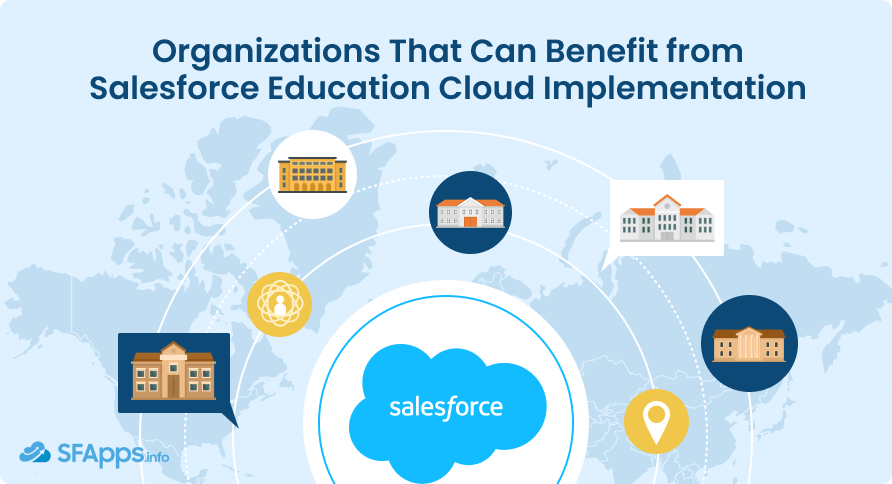
Salesforce Education Cloud is a versatile platform designed to meet the needs of a wide range of educational institutions. Its comprehensive features and customizable nature make it suitable for various types of organizations, each with its unique challenges and goals. Here’s how different organizations can benefit from implementing Salesforce Education Cloud:
Universities and Colleges
- Comprehensive Student Management: Manage student records, admissions, enrollments, and engagements in a unified platform, enhancing student experiences and academic outcomes.
- Alumni Engagement and Fundraising: Utilize advanced CRM tools to maintain strong relationships with alumni, driving donations and long-term engagement.
Vocational and Technical Schools
- Skills and Career Tracking: Track student skill development and match students with career opportunities, leveraging Salesforce’s powerful analytics and database capabilities.
- Industry Partnership Management: Manage relationships with industry partners for student placements, apprenticeships, and collaborative programs.
K-12 Schools
- Parent and Student Portals: Offer portals for parents and students to access academic information, communicate with teachers, and participate in school communities.
- Performance and Progress Tracking: Monitor student progress through detailed reports and dashboards, facilitating early intervention and support where needed.
Corporate Training Departments
- Employee Learning and Development: Streamline employee training programs, track participation and progress, and assess the impact of training on performance and productivity.
- Certification and Compliance Tracking: Ensure employees meet industry standards and regulatory requirements, with automated tracking and reporting.
Nonprofit Educational Programs
- Donor Management and Reporting: Efficiently manage donor records, campaign performance, and generate detailed reports to share with stakeholders.
- Participant Tracking: Monitor program participation, outcomes, and impact, utilizing data to improve program effectiveness and secure funding.
Each of these organizations stands to gain significantly from the tailored features, efficiency improvements, and data-driven insights offered by Salesforce Education Cloud. By implementing this platform, they can not only streamline their administrative processes but also create more engaging and effective learning environments.
Salesforce Education Cloud Pricing
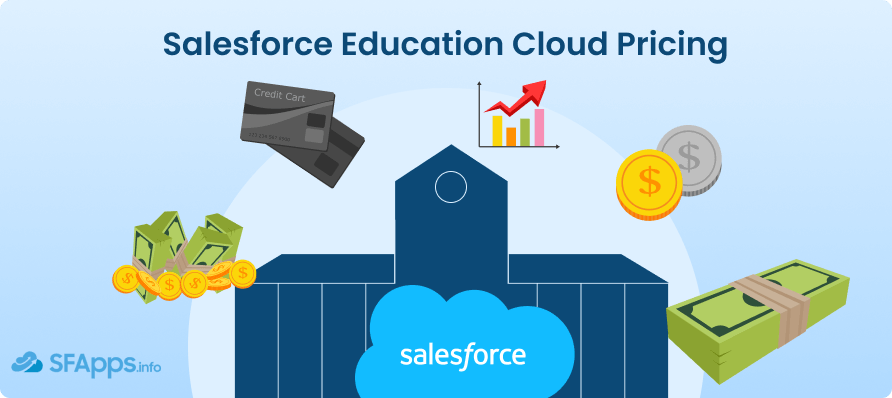
Licensing Costs
Salesforce Education Cloud offers different editions with specific functionalities designed for educational settings. The Enterprise Edition is priced at $81.25 per user/month, providing a comprehensive CRM system with features supporting recruitment, admissions, student success, and more. For those needing unlimited CRM power and additional support, the Unlimited Edition is available at $138.75 per user/month. Institutions can also opt for Limited Staff Access at $25 per user/month for extending certain Education Cloud features across the campus.
Implementation Costs
The cost of implementing Salesforce for Education and pricing can vary widely based on several factors, including the extent of customization, data migration needs, and the choice between using an implementation partner or in-house resources. Customization and integrations can range from $20 to $190 per hour for a skilled Salesforce developer, highlighting the platform’s versatility but also indicating potential costs based on complexity and required functionality.
Ongoing Expenses
Post-launch, institutions should account for maintenance, updates, and support services, which can either be managed in-house or through third-party partners. The decision between building an internal team or outsourcing will significantly affect long-term operational costs.
Additional Considerations
Integrating Salesforce Education Cloud with existing systems or leveraging AppExchange applications for enhanced functionality can introduce additional expenses. Moreover, the cost of user training and certification, essential for maximizing the platform’s benefits, should not be overlooked.
Organizations considering Salesforce Education Cloud should conduct a detailed needs assessment and engage with Salesforce consultants or partners to understand the full scope of potential costs. This approach ensures alignment with both educational and financial objectives, enabling a more informed decision-making process.
Key Factors for Selecting Salesforce CRM Tools for Education
Embarking on the journey to integrate a Salesforce CRM tool involves a detailed assessment of several crucial factors:
- Integration Capabilities: Evaluate how well the Salesforce tool integrates with existing educational software and platforms your institution relies on.
- Customization Potential: Salesforce is renowned for its flexibility. Determine the extent to which you can tailor the tool to meet the specific demands of your educational environment.
- Ease of Implementation and Maintenance: Consider the simplicity of deploying the Salesforce tool and what ongoing maintenance will entail, ensuring minimal disruption to educational processes.
- User Experience and ROI: Explore the tool’s track record for user satisfaction and the potential return on investment, emphasizing improvements in student engagement and administrative efficiency.
- Customer Support: Salesforce is known for its comprehensive support network. Examine the level of support available to guarantee smooth operations and prompt troubleshooting.
- Scalability: Ensure the Salesforce tool can grow with your institution, supporting evolving needs without requiring frequent overhauls.
Steps to Finding the Ideal Salesforce CRM Tool for Education
- Identify Institutional Challenges: Start by documenting the main obstacles and inefficiencies your institution faces. Understanding these pain points is critical in pinpointing what you need from a Salesforce CRM tool.
- Assess Current and Future System Needs: List all current software and systems in use for key processes like recruitment, admissions, and alumni relations. This helps in evaluating how a Salesforce CRM tool can integrate or replace these systems effectively.
- Establish a Budget: Define your financial parameters for investing in a Salesforce CRM solution. Consider not only the size of your user base but also the specific features that will bring the most value to your institution.
- Compare Features and Support Options: Focus on your immediate requirements while keeping future growth in mind. Choose a Salesforce tool that offers robust support from the get-go, ensuring you maximize its benefits from day one.
- Seek Reviews and Testimonials: Research feedback from other educational institutions that have implemented Salesforce CRM tools. Their experiences can provide invaluable insights into how a tool could perform in your setting.
- Shortlist and Demo: After thorough evaluation, narrow down your options to the most promising Salesforce CRM tools. Arrange for demonstrations and involve stakeholders from various departments to gather a wide range of feedback.
Selecting the right Salesforce CRM tool for higher education Salesforce is an intricate process that combines strategic planning, in-depth research, and collaboration across departments. By meticulously following these steps, educational institutions can choose a solution that not only meets their current operational and engagement needs but also supports their long-term goals. This careful selection ensures a robust foundation for enhancing educational experiences and administrative efficiency, ultimately fostering a more connected and responsive educational community.
Implementing Salesforce CRM in Education
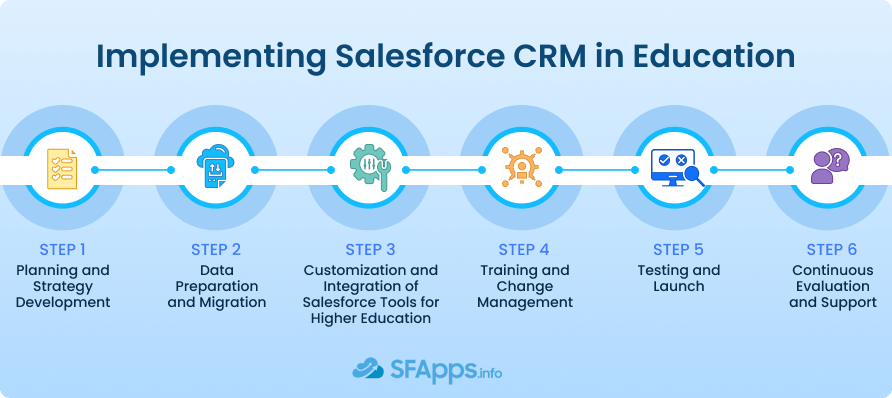
Implementing a Salesforce CRM tool within an educational institution is a significant undertaking that requires careful planning and execution. Here’s a detailed guide to ensure a smooth and effective implementation process.
1. Planning and Strategy Development
- Define Objectives: Clearly outline what you aim to achieve with the Salesforce CRM tool, including enhanced student engagement, streamlined administrative processes, and improved data management.
- Assemble a Project Team: Form a cross-functional team comprising members from IT, admissions, student services, and other relevant departments to guide the implementation process.
2. Data Preparation and Migration
- Audit Existing Data: Review and clean existing data to ensure accuracy and completeness before migration to the new Salesforce CRM system.
- Map Data: Carefully plan how current data will migrate to Salesforce, ensuring that all critical information is accounted for and accurately transferred.
- Simplify Data Preparation: To make the move easier, you can use ETL Tools for Salesforce, like Sliced Bread. It helps clean up your data, adjust it to fit Salesforce, and load it in bulk, saving time and helping avoid mistakes during the migration.
3. Customization and Integration of Salesforce Tools for Higher Education
- Tailor the CRM to Your Needs: Utilize Salesforce’s extensive customization options to adapt the CRM tool to your institution’s specific workflows and processes.
- Integrate with Other Systems: Ensure seamless integration with existing platforms such as Learning Management Systems (LMS), finance software, and email Salesforce Marketing Cloud education tools to create a cohesive ecosystem.
4. Training and Change Management
- Develop Training Programs: Create comprehensive training materials and sessions for all users, focusing on how to use the new CRM tool effectively in their specific roles.
- Manage Change: Address potential resistance by communicating the benefits and improvements the Salesforce CRM tool brings to each stakeholder group.
5. Testing and Launch
- Conduct Thorough Testing: Before going live, perform extensive testing of the CRM tool to identify and resolve any issues, ensuring that all functionalities work as expected.
- Plan a Phased Rollout: Consider launching the CRM system in phases to manage the transition smoothly and address any unforeseen challenges in a controlled manner.
6. Continuous Evaluation and Support
- Monitor Performance: Regularly assess the CRM tool’s performance against your defined objectives, making adjustments as necessary to ensure continued success.
- Provide Ongoing Support: Establish a support system for users to address questions and concerns, ensuring they have the assistance needed to fully leverage the CRM tool.
Implementing Salesforce CRM in an educational institution is a transformative process that can lead to significant benefits in student engagement, operational efficiency, and data-driven decision-making. By following these detailed steps, institutions can ensure a successful transition to a more connected and responsive educational environment.
Navigating Challenges with Salesforce CRM Implementation
As educational institutions look towards the future with Salesforce CRM, understanding potential challenges and strategizing for success becomes paramount. While Salesforce CRM offers robust solutions for enhancing educational experiences and operational efficiency, navigating its complexities requires foresight and planning. Here are key considerations for overcoming challenges and ensuring the long-term success of your Salesforce CRM initiative.
Identifying and Overcoming Implementation Challenges
- User Adoption: One of the primary challenges is ensuring widespread adoption among faculty, staff, and students.
Solution: Implement comprehensive training programs and user support to ease the transition, showcasing the direct benefits to all users.
- Data Integration and Quality: Integrating disparate data sources and maintaining data quality can be daunting.
Solution: Prioritize data cleanup initiatives before migration and establish ongoing data governance practices.
- Customization vs. Standardization: Finding the right balance between customization and standardization is crucial for maintaining system efficiency and adaptability.
Solution: Adopt a strategic approach to customization, focusing on enhancements that provide clear value while adhering to best practices.
Strategies for Sustained Success
- Continuous Improvement: Treat your Salesforce CRM implementation as a living system that evolves. Regularly assess system performance, user feedback, and business objectives to identify areas for improvement.
- Engage with the Salesforce Community: Leverage the wealth of knowledge and resources available within the Salesforce community cloud education. Engaging in forums, user groups, and conferences can provide insights and solutions to common challenges.
- Leverage Salesforce Updates: Salesforce continually evolves, offering new features and improvements. Stay informed about these updates and evaluate how they can be integrated into your institution’s operations to drive additional value.
Preparing for Future Technological Shifts
- Embrace Emerging Technologies: As technologies like AI, IoT, and blockchain continue to mature, exploring their potential applications within the Salesforce ecosystem can offer competitive advantages and innovative ways to engage with students.
- Focus on Digital Transformation: Beyond the technical implementation, consider the broader digital transformation of your institution. Salesforce CRM for higher education should be a key component of a wider strategy that embraces digital processes and a culture of innovation.
Cultivating a Salesforce CRM-Centric Culture
- Foster Collaboration: Encourage cross-departmental collaboration to maximize the benefits of Salesforce CRM. A unified approach ensures that the system supports comprehensive institutional goals, from student success to operational excellence.
- Promote Data-Driven Decision Making: Cultivate a culture where decisions are increasingly based on data and insights derived from Salesforce CRM. This shift can enhance strategic planning and day-to-day operations.
By anticipating challenges and adopting a strategic approach to implementation, continuous improvement, and cultural transformation, educational institutions can maximize the benefits of Salesforce CRM. This proactive stance ensures that Salesforce CRM remains a powerful tool for achieving institutional goals, adapting to technological advancements, and enhancing the educational experience for all stakeholders.
Education Cloud Solutions
Salesforce CRM offers a lot of applications specifically designed to enhance functionality and streamline processes within the education sector. These apps, available on the Salesforce AppExchange, cater to various needs, from student management to alumni engagement. Here are some of the Salesforce apps expected to gain popularity in the education industry:
CoPilot – A 360 Degree View of Student Success
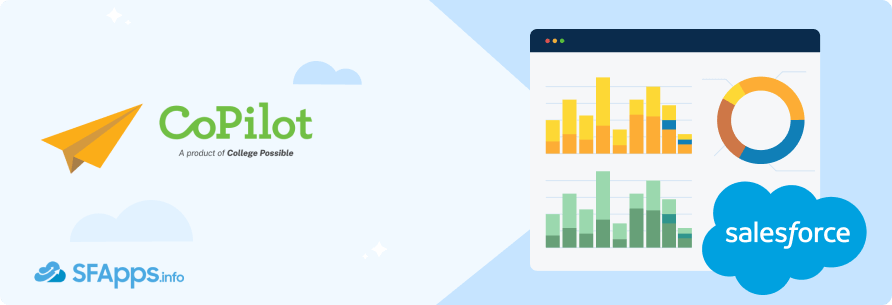
CoPilot equips advisors in the non-profit and education sectors with a comprehensive student information system. This enables them to easily access and analyze essential data, facilitating the delivery of precise, data-driven interventions for students.
TargetX Recruitment Suite
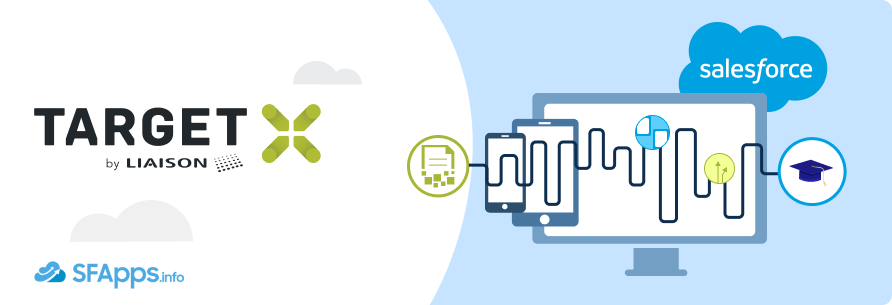
The TargetX Recruitment Suite is designed for educational institutions such as schools, colleges, and universities aiming to attract suitable prospective applicants and enroll the best-fit students. By utilizing the TargetX Recruitment CRM, these institutions can boost their application numbers, streamline the enrollment process, and draw in new prospects through a user-friendly experience. For over two decades, TargetX has been at the forefront of delivering efficient, student-focused technology solutions to the Salesforce in higher education market. It emphasizes comprehensive training and support methods and has established itself as the leading provider of pre-configured recruitment and admissions solutions.
Affinaquest, Advancement RM™
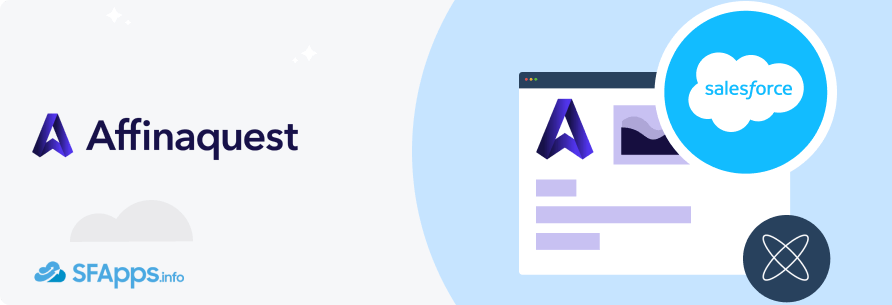
Affinaquest empowers non-profit organizations and educational institutions by integrating comprehensive campaign and prospect management directly within the Salesforce interface. This platform harnesses the power of your analytics for business intelligence, enabling accurate tracking of fundraising efforts and donor information to craft successful campaigns. In recognition of its impact and effectiveness, Affinaquest was honored as the Sales Partner of the Year (ISV Education AMER) by Salesforce in 2020.
RIO Education Student Information System on Salesforce Education Cloud (EDA)
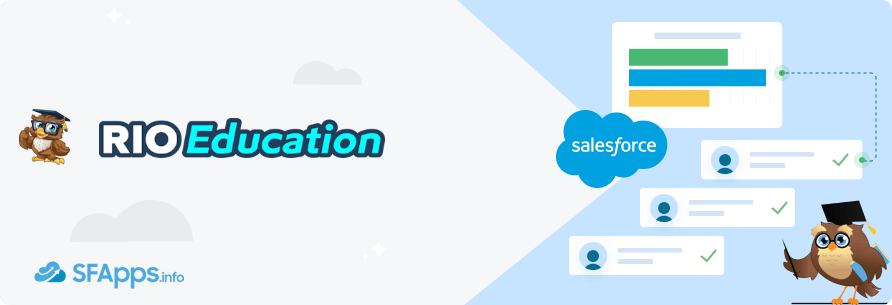
Optimize your student management and compliance reporting with the RIO Education System, a Salesforce-native solution. This platform offers students and staff access to essential services like real-time updates, support, schedules, and academic results, streamlining administrative processes and saving time. RIO Education serves as a comprehensive hub, enhancing the educational experience for both students and staff by keeping them connected and informed.
Recruitment & Admissions on Salesforce for Higher Education – Enrollment Rx
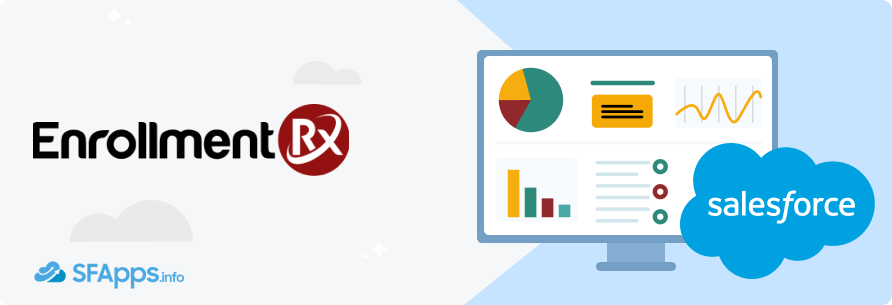
ERX Core is designed to streamline Salesforce’s Recruitment, Admissions, and Decisions (RAD) process, eliminating the need for multiple systems to manage prospective students. It provides comprehensive visibility into the journey of prospective students, from their initial inquiry all the way through to enrollment.
The system features customizable triggers to facilitate enrollment processes, consolidating all admissions requirements in one centralized location. It simplifies the assignment of counselors or advisors, supports the management of deferred applications, and enables detailed reporting on all lead sources to analyze enrollment yield effectively.
ERX Core stands out for its high level of customization for enrollment management, backed by thorough documentation, continuous support, and regular updates. It’s designed to navigate the complexities of higher education, serving a wide range of institutional types with its versatile features.
These apps represent just a glimpse of what Salesforce offers to educational institutions, enabling them to enhance engagement, streamline operations, and ultimately improve educational outcomes. By leveraging these tools, institutions can customize their Salesforce CRM to meet their unique needs and challenges.
Education Cloud Services
Integrating Salesforce CRM with other software solutions can significantly enhance its functionality, providing educational institutions with a more comprehensive and efficient system. Here are five key Salesforce integrations that are particularly beneficial for the education sector, designed to streamline operations, improve student engagement, and offer deeper insights:
Canvas LMS Integration
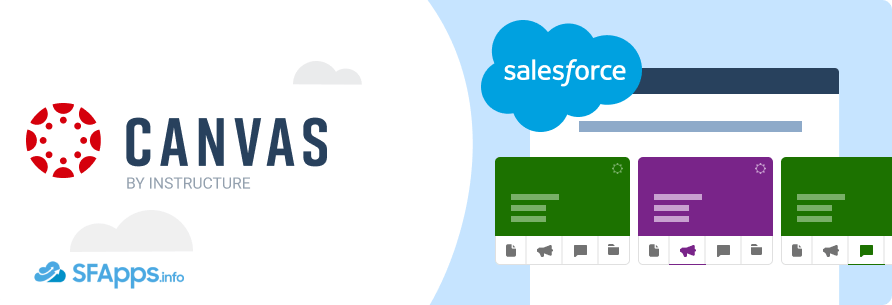
- Description: Canvas LMS by Instructure is one of the leading learning management systems (LMS) that integrates seamlessly with Salesforce. This integration allows institutions to sync course data, student information, and academic outcomes between Salesforce and Canvas, providing a unified view of student learning experiences.
- Benefits: Facilitates real-time tracking of student progress, enhances communication between faculty and students, and simplifies administrative tasks.
Blackboard Learn Integration
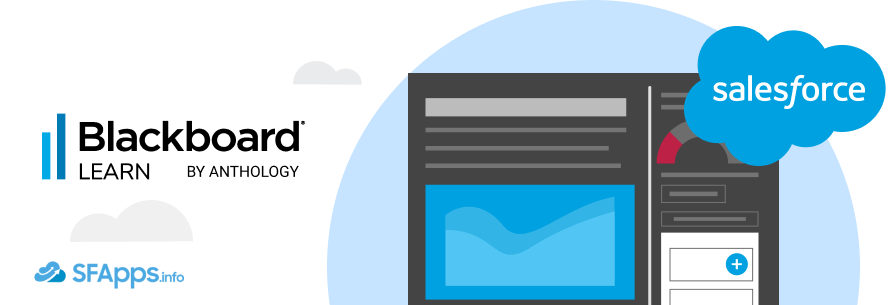
- Description: Blackboard Learn is another widely used LMS that integrates with Salesforce. This connection enables the transfer of enrollment data, grades, and other educational records from Blackboard to Salesforce, offering educators and administrators comprehensive insights into student performance.
- Benefits: Streamlines data management, improves academic advising, and supports targeted intervention strategies.
Zoom Integration
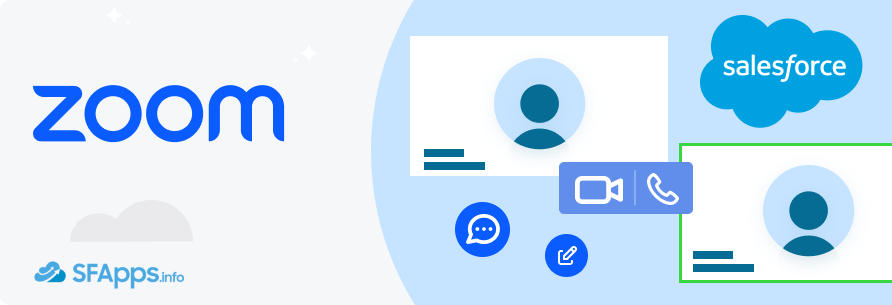
- Description: With the increase in online and hybrid learning models, integrating Zoom with Salesforce allows educational institutions to manage virtual classrooms and meetings directly within Salesforce. This integration facilitates scheduling, attendance tracking, and the collection of engagement metrics.
- Benefits: Enhances the organization of virtual sessions, improves attendance tracking, and enables data-driven decisions regarding online education strategies.
Google Workspace Integration
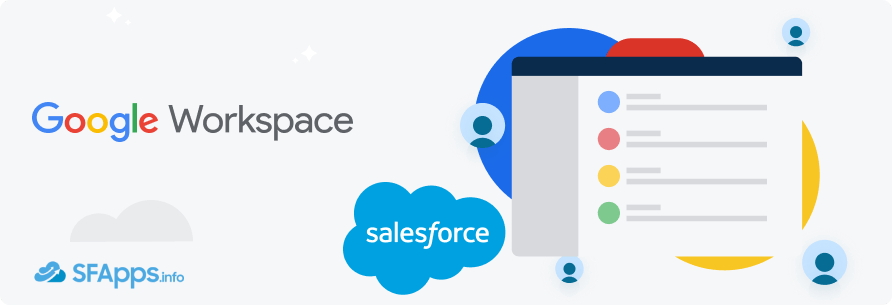
- Description: Google Workspace (formerly G Suite) integration with Salesforce brings together productivity tools like Gmail, Docs, Sheets, and Drive with Salesforce’s CRM capabilities. This integration enables seamless collaboration, document sharing, and communication within the Salesforce platform.
- Benefits: Streamlines collaboration among staff and students, simplifies document management, and consolidates communication channels.
Microsoft 365 Integration
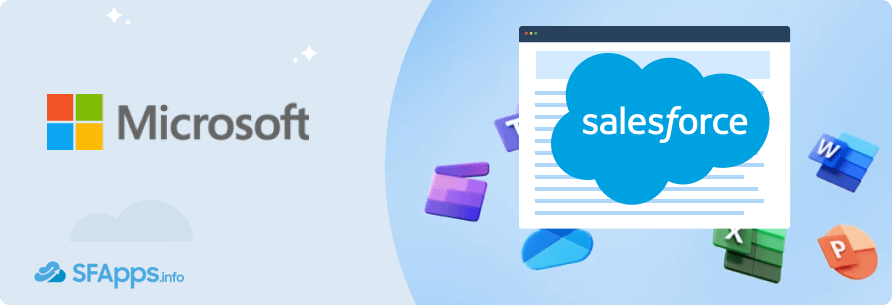
- Description: Integrating Microsoft 365 with Salesforce combines the robust functionality of Microsoft’s productivity suite, including Outlook, Word, Excel, and Teams, with Salesforce CRM. This integration improves workflow efficiency, data consistency, and communication across departments. If you’re looking for more details about activity capture, refer to eac Salesforce article.
- Benefits: Enhances productivity, ensures data coherence across platforms, and supports comprehensive communication strategies.
These integrations leverage the power of Salesforce CRM to create a more connected, efficient, and insightful educational environment. By connecting Salesforce with these external systems, institutions can automate processes, gain deeper insights into student and faculty needs, and deliver a more personalized and effective educational experience.
Team Setup for Implementing Salesforce Education Cloud
Successfully implementing Salesforce Education Cloud requires a well-structured team with diverse skills and responsibilities. This team will oversee the project from planning through to execution and post-launch support. Here’s an ideal setup for a team tasked with implementing Salesforce Education CRM in an educational institution:
Project Manager (PM)
- Responsibilities: Oversees the entire implementation project, ensuring it stays on schedule and within budget. The PM coordinates between different team members, stakeholders, and external Salesforce consultants or partners.
- Skills Needed: Strong project management skills, experience with CRM implementations, excellent communication, and leadership abilities.
Salesforce Administrator
- Responsibilities: Configures the Salesforce Education Cloud environment, sets up user accounts, and customizes the platform to meet the institution’s specific needs. Post-implementation, they manage the system, making adjustments as necessary based on user feedback.
- Skills Needed: In-depth knowledge of Salesforce, including Education Cloud and EDA (Salesforce Higher Education Data Architecture), along with strong analytical and problem-solving skills.
You can find more details and insights in the salesforce admin interview questions and answers guide.
Data Analyst/Manager
- Responsibilities: Responsible for the migration, integration, and management of data within Salesforce Education Cloud. Ensures data quality and consistency across the system.
- Skills Needed: Expertise in data management practices, experience with Salesforce data tools, and proficiency in data analysis and reporting.
Salesforce Developer(s) with Education Cloud Experience
- Responsibilities: Customizes Salesforce Education Cloud beyond out-of-the-box capabilities using Apex, Visualforce, or Lightning Web Components. Developers may also integrate Salesforce with other systems or create custom applications as needed.
- Skills Needed: Proficiency in Salesforce development languages and tools, understanding of web development standards, and strong technical problem-solving skills.
Training and Support Specialist
- Responsibilities: Develops and delivers training programs for end-users, including faculty, staff, and administrators. Post-launch, they provide ongoing support and resources to ensure successful adoption of the platform.
- Skills Needed: Strong understanding of Salesforce Education Cloud functionalities, excellent teaching and communication skills, and patience for troubleshooting user issues.
Stakeholder Representatives (Faculty, Administrators, IT Staff)
- Responsibilities: Represent the needs and concerns of their respective departments. They provide input during the planning and implementation phases and help facilitate adoption among their peers.
- Skills Needed: Deep understanding of their department’s processes and needs, ability to communicate effectively with the project team, and willingness to advocate for the system’s use.
This team structure ensures that all aspects of the Salesforce Education Cloud implementation are covered, from technical configuration and data management to user training and adoption. By assembling a team with these roles, educational institutions can ensure a smooth and effective rollout of Salesforce Education Cloud, laying the foundation for improved operations and enhanced student engagement.
How to Become a Salesforce Education Cloud Certified Consultant?
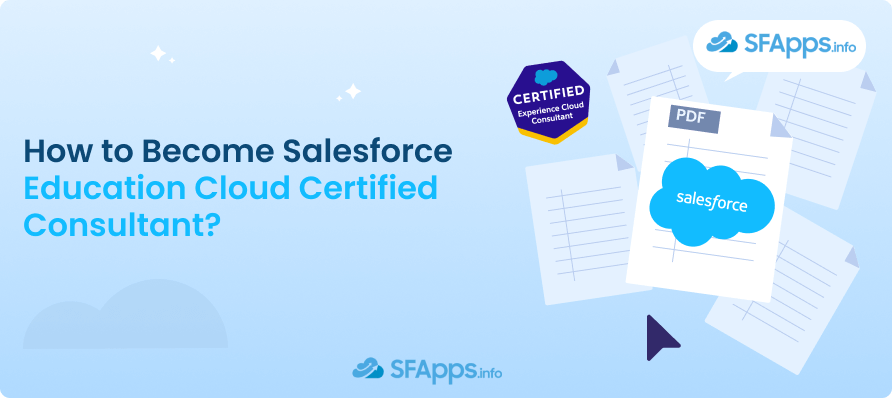
Gaining Salesforce Education Cloud certification is a strategic move for professionals involved in the implementation and management of Salesforce solutions in educational institutions. This certification validates expertise in utilizing Salesforce Education Cloud to its fullest potential, ensuring the platform meets the diverse needs of students, faculty, and staff.
Insight:
It’s better to start from Salesforce Associate Certification before, if you don’t have Saleforce Certified Administrator certification yet. Refer to Salesforce Associate Certification, which helps you with preparation.
Overview
Salesforce offers specialized certifications that cater to different roles within the ecosystem, including administrators, developers, and consultants. For those working directly with Salesforce Education Cloud, the Salesforce Certified Education Cloud Consultant certification is particularly relevant. This certification demonstrates an individual’s ability to design and implement Salesforce Education Cloud solutions, ensuring they align with educational best practices and institution-specific requirements.
Key Benefits
- Professional Recognition: Achieving certification distinguishes you as an expert in Salesforce Education Cloud, enhancing your professional credibility and visibility.
- Improved Implementation Success: Certified individuals possess a deep understanding of Education Cloud, contributing to more effective and efficient implementations and customizations.
- Career Advancement: Certification can open doors to new career opportunities, including roles focused on Salesforce implementation, customization, and management within educational institutions or consulting firms.
Preparation and Examination
- Study Materials: Salesforce provides comprehensive study materials, including trailhead modules, implementation guides, and exam preparation resources, to help candidates prepare for the certification exam.
- Exam Format: The certification exam typically includes multiple-choice questions that test your knowledge of Education Cloud functionalities, best practices for implementation, and the ability to solve common challenges faced by educational institutions.
- Continuing Education: To maintain certification, individuals must complete ongoing learning requirements and stay up-to-date with Salesforce releases, ensuring their skills remain relevant in a rapidly evolving technology landscape.
Prerequisites
- Salesforce Certified Administrator: You have to be a Certified Salesforce Administrator first before scheduling Salesforce Education Cloud Certification. Becoming a Salesforce Certified Administrator is an essential prerequisite that sets the stage for specializing in the Education Cloud. This step ensures that certification candidates have a solid grasp of Salesforce’s core functionalities before diving into the more intricate aspects of the Education Cloud, maximizing the success of their implementation projects and enhancing their ability to support educational institutions effectively.
For those involved in the implementation and ongoing management of Salesforce Education Cloud in educational settings, obtaining certification is a valuable step towards ensuring the success of their projects and advancing their professional development.
Frequently Asked Questions about Salesforce Education Cloud Implementation
What is Salesforce Education Cloud?
Salesforce Education Cloud is a comprehensive suite of solutions built on the Salesforce platform, tailored specifically for the needs of educational institutions. It provides tools for student and faculty engagement, admissions, alumni relations, and more, all designed to create a connected campus experience.
How does Salesforce Education Cloud support student success?
The platform enables institutions to track student progress, manage advising and student support services, and use predictive analytics to identify students who might need additional support, thereby personalizing the student experience and improving outcomes.
Can Salesforce Education Cloud integrate with existing LMS and SIS systems?
Yes, Salesforce Education Cloud is designed to integrate seamlessly with many Learning Management Systems (LMS) and Student Information Systems (SIS), ensuring that institutions can leverage their existing investments while benefiting from Salesforce’s capabilities.
How long does it typically take to implement Salesforce Education Cloud?
The implementation timeline can vary widely depending on the size of the institution, the complexity of the existing systems, and the scope of the Salesforce deployment. Projects can range from a few months to over a year. Working with a Salesforce implementation partner can help tailor the timeline to your institution’s specific needs.
Is training available for staff on how to use Salesforce Education Cloud?
Yes, Salesforce offers a variety of training options, including online resources, in-person workshops, and custom training sessions. Additionally, the Salesforce Trailhead platform provides a wide range of educational materials to help users at all levels improve their skills and knowledge of the platform.
How does Salesforce ensure data security and compliance within the Education Cloud?
Salesforce is committed to the highest standards of data security and compliance. Education Cloud is built on Salesforce’s secure and trusted cloud infrastructure, with robust security measures and compliance certifications to protect sensitive educational data.
Can Salesforce Education Cloud be customized to fit specific institutional needs?
Absolutely. Salesforce Higher Education Cloud is highly customizable, allowing institutions to tailor the platform to meet their unique requirements. Through the use of custom objects, fields, workflows, and applications from the Salesforce AppExchange, institutions can ensure the platform aligns with their specific processes and goals.
What types of educational institutions can benefit from Salesforce Education Cloud?
Salesforce Education Cloud is versatile and scalable, making it suitable for a wide range of educational institutions, including Salesforce K 12 education schools, vocational schools, community colleges, universities, and continuing education programs. Its customizable nature allows it to serve the diverse needs of different types of institutions effectively.
How does Salesforce Education Cloud facilitate communication with students?
The platform offers a variety of communication tools, including email, SMS, social media integration, and personalized portals, enabling institutions to communicate with students through their preferred channels. These tools support targeted messaging and campaigns, fostering better engagement and connection with the student body.
Are there any grants or discounts available for educational institutions implementing Salesforce Education Cloud?
Salesforce offers a philanthropic model that includes special Salesforce Education pricing and grants for educational institutions and nonprofit organizations. Eligible institutions can benefit from discounted rates and access to grant opportunities to support their Salesforce implementation. It’s advisable to contact Salesforce directly or visit their website for the most current information on available offers.
How does Education Cloud Salesforce support alumni relations and fundraising efforts?
The platform provides robust tools for managing alumni databases, tracking engagement and donation history, and automating communication and outreach efforts. Through personalized engagement strategies, institutions can strengthen relationships with alumni, encouraging increased participation and support for fundraising campaigns.
What kind of support can institutions expect after implementing Salesforce CRM for Higher Education Cloud?
Post-implementation, institutions have access to Salesforce’s comprehensive support services, including online resources, technical support teams, and user communities. Salesforce also offers ongoing training and updates to ensure institutions can continue to optimize the use of Education Cloud as their needs evolve and new features become available.
Final Thoughts
Implementing Salesforce Education Cloud represents a transformative step for educational institutions, enabling them to streamline operations, enhance student engagement, and leverage data-driven insights for informed decision-making. From the initial selection of the platform to the detailed planning of its implementation, and through the continuous optimization post-deployment, institutions must navigate a complex journey. However, the benefits of such an endeavor are substantial, offering a more connected, efficient, and responsive educational environment.
The success of Salesforce Education Cloud for Salesforce higher education customers lies not just in its robust features and functionalities but in the strategic approach institutions take towards its adoption and integration. The selection of relevant apps and integrations, the assembly of a dedicated implementation team, and the pursuit of specialized certifications are foundational steps that pave the way for a successful deployment. Yet, the journey doesn’t end with implementation. Ongoing maintenance, user training, and the adaptation of the platform to meet evolving needs ensure that Salesforce Education Cloud continues to deliver value long into the future.
Institutions that commit to this journey, leveraging best practices and fostering a culture of continuous improvement and innovation, position themselves at the forefront of educational excellence. They not only enhance their operational efficiency and student services but also cultivate an environment where data informs strategy, decisions are proactive, and the educational experience is personalized and engaging.
As the educational industry evolves, the flexibility and scalability of the Salesforce Education Cloud mean that institutions can adapt swiftly to changing demands, ensuring they remain competitive and continue to meet the high expectations of their students and faculty. The journey with Salesforce Education Cloud is one of ongoing discovery and growth, where the potential for impact is limited only by the institution’s vision and commitment to excellence.

Dorian is a 6X Certified Salesforce Developer and Administrator with a start in the IT world as a CRM Admin in 2020. Since diving into Salesforce in 2021 via Trailhead and Focus on Force, he has achieved a Ranger Rank, earned several Superbadges, and bagged certifications including the Salesforce Certified Administrator, Platform App Builder, Associate and Platform Developer I by 2023. In 2024 he also became Salesforce Certified AI Associate and earned Certified AI Specialist Certification in 2025. Dorian is very keen on continuous learning, always looks for fresh ways to improve his knowledge. He enjoys running, boxing, kickboxing and reading diverse kinds of books in his free time.


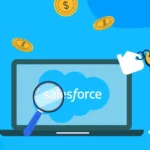 Previous Post
Previous Post Next Post
Next Post
This kind of success shows how Salesforce Education Cloud can address specific challenges and significantly enhance overall operations.